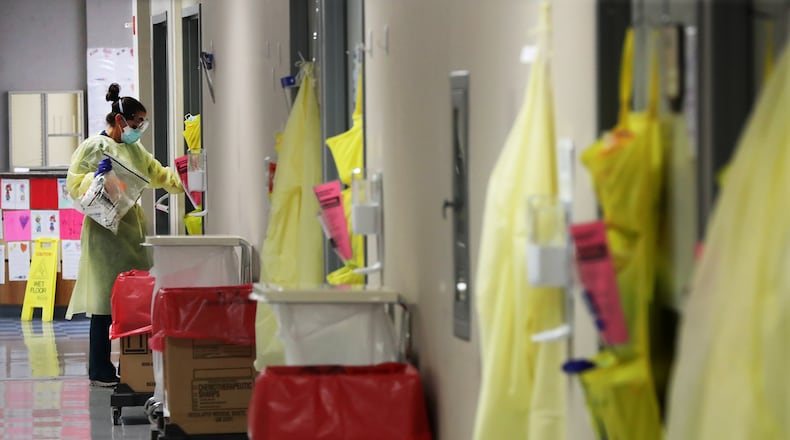Patients seriously ill with COVID-19 are now taking up one-third of all Georgia hospital beds — a pandemic record. Adult ventilator use has far outpaced the previous peak in January.
The state’s official count of COVID-19 patients this past week in Georgia’s hospitals exceeded the January peak. And every hospital across Georgia is now full to the point of overflowing.
Some have seen their COVID-19 numbers drop, but that’s in large part because patients are dying.
“We learned early in the pandemic that a spike in COVID hospitalizations is typically followed by a spike in deaths two to three weeks later,” Scott Steiner, CEO of Phoebe Putney Health System, said Tuesday. “We grieve with these families, and we ask our community to keep them and our care teams in your prayers.”
Credit: Curtis Compton / Curtis.Compton@
Credit: Curtis Compton / Curtis.Compton@
It’s a picture of hospital systems in crisis. And the worst may be ahead. The official count of COVID-19 deaths in Georgia exceeded 20,000 on Friday, marking a sobering milestone.
Here’s a look at major developments related to COVID-19 over the past week.
Georgia hospitals in crisis as COVID-19 patient load sets record
Back in January, when “code blues” sounded relentlessly to summon teams for medical emergencies and morgues deployed mobile units for extra space to store bodies, Georgia got a reprieve. Cases soon plunged as holiday travel ended and many of the elderly became vaccinated.
This time, with vaccination rates stubbornly low and the highly contagious delta variant pervasive, hospitals expect the trendline to keep climbing well into September. As the numbers swell, hospital beds are being filled with younger unvaccinated adults as well as children. On Friday, the state reported that hospitals had 6,000 COVID-19 patients, exceeding the January peak of 5,709.
The coming days could bring further delays in care for people sick with COVID-19 or facing other medical emergencies. Atlanta’s large children’s hospitals at times were so packed Tuesday that they were limiting transfers from other hospitals. Intensive care units are full at many hospitals, creating risks for all those who have to wait for a critical care bed, whether they have COVID-19 or not. A critical nursing shortage means adding more beds in some hospitals will be pointless: There aren’t any more nurses available to staff them. It’s already hard or impossible to transfer patients from small hospitals to larger ones that can provide advanced care.
That has resulted in shortages of oxygen in recent days at some of the state’s rural hospitals, as they had to treat COVID-19 patients short of breath instead of transferring them. The shortage prompted Gov. Brian Kemp to loosen regulations for shipping compressed oxygen amid supply shortages.
Credit: JOHN SPINK / AJC
Credit: JOHN SPINK / AJC
Floyd County boy dies as COVID-19 surges among Georgia’s children
As pediatric cases of COVID-19 started spiking across Georgia last month, 13-year-old Porter Helms was among those who tested positive. The eighth-grader had been quarantining at home in Floyd County for about a week when his father checked on him and gave him medications at 3 a.m. Tuesday.
When his dad came back two hours later, Porter wasn’t breathing. Emergency workers tried CPR and transported him to the hospital, but he could not be revived, Floyd County Coroner Gene Proctor said.
The cause of death, the coroner determined, was respiratory failure due to COVID-19. Proctor said he did not know the child’s vaccination status.
Porter’s school, where masks were recently required, said it was heartbroken that the pandemic had claimed a child’s life.
During previous surges of COVID-19 in Georgia, children and teens were largely spared from serious illness, and child deaths were extremely rare. Of the more than 20,000 confirmed COVID-19 deaths, there have been 17 reported deaths of children.
Confirmed COVID-19 cases among children are now at their highest point of the pandemic, and the delta variant is pushing record numbers of young Georgians into pediatricians’ offices, emergency departments and even hospital beds.
Scientists push back on call to endorse booster shots for all
Responding to the resurging pandemic and breakthrough infections, President Joe Biden and some top health officials are pushing for the U.S. to begin vaccine booster shots by Sept. 20. But the committee of scientists who officially recommend whether to take such steps met Monday and pushed back.
The group, the Advisory Committee on Immunization Practices, advises the Atlanta-based U.S. Centers for Disease Control and Prevention on whether scientific data merit approval or warnings on vaccines. The scientists said they still had fundamental questions to answer, such as whether the increase in COVID-19 infections after vaccination, so-called breakthrough cases, was related at all to waning effectiveness of the vaccines.
Credit: Ben Gray
Credit: Ben Gray
Without calling them “booster shots,” the Food and Drug Administration has authorized an extra shot for certain people with compromised immune systems, such as organ transplant recipients, after they have completed their original coronavirus vaccine regimen. But no decisions have been made for other vulnerable groups, much less the general public.
That leaves Georgians who are now eager for a booster shot not knowing what comes next.
But Dr. Carlos del Rio, professor of medicine at Emory University, said, “The problem is, by focusing on boosters, we’re distracting from the biggest problem, which is all the unvaccinated people.”
Staff writers Tamar Hallerman and J. Scott Trubey contributed to this article.
Keep Reading
The Latest
Featured







